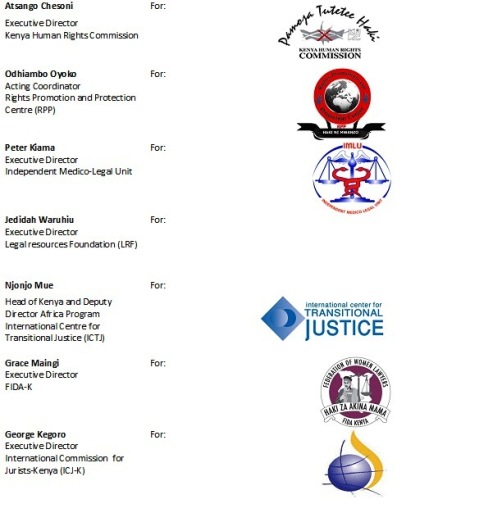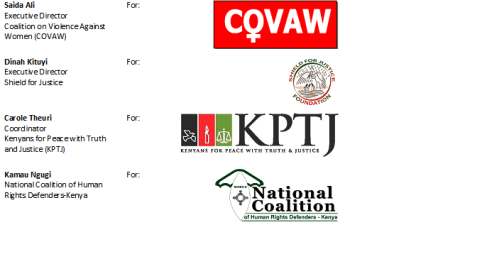We are particularly glad that the interview process upheld the principles of transparency with uninhibited participation of the public, the civil society, the media and international observers. For this we laud the NPSC. We further recognize the extra effort the Commission has expended in expediting the interviewing process, recommending the successful candidates and forwarding their names to the relevant authorities for appointment. We are appreciative of the fact that the Commission worked long hours including weekends to ensure strict observance of recruitment deadlines.
Whereas, we are cognizant of the fact that the NPSC has had to balance various interests including gender, academic qualifications, experience, integrity and regional balances in recommending the candidates for appointment, we strongly call for a closer scrutiny of the recommended candidates with a view to ascertaining their suitability for the jobs.
The PRWG-K sat through all the interviews as observers and prepared a report which was presented to the NPSC before it identified the nine individuals for appointment to the three positions. Our reports interrogated the suitability of each of the twenty seven candidates’ on the basis of their integrity (as outlined in chapter 6 of the constitution), professionalism, academic qualifications, experiences and the general ability and willingness to steer forward police reforms.
We have reviewed the nine names recommended for appointment and wish to state as follows:
- That we are particularly concerned that some of the recommended candidates had serious integrity and suitability issues raised against them by the public, the civil society and other agencies during the interviews. These allegations range from corruption, drug trafficking, contempt of court processes and their role in during the 2007/2008 PEV. As such we call for a thorough and comprehensive review of the suitability of each of the recommended candidates to ensure the much needed police reforms are steered by competent and reform minded individuals.
- In particular, we call upon the NPSC to outline to the public their specific findings on the suitability of the following:
i) Ms. Grace Syombua Kaindi: What were the Commission’s findings on her role during the 2007/2008 PEV in Kisumu where she served as the PPO at the height of the violence? Did the Commission investigate her alleged reluctance to cooperate with the ICC in procuring evidence to prosecute the perpetrators?
ii) Mr. David Mwole Kimaiyo: What were the Commission’s findings on his role during the 2007/2008 PEV? Under what circumstances was he transferred to the Ministry of Gender at the height of the PEV?
iii) Mr. Francis Ndegwa Muhoro: Did the Commission investigate his alleged roles in the DRC gold syndicate, contempt of court accusations and drug dealing?
iv) Mr.Samwel Arachi: Did the Commission investigate serious accusations of ethnic favoritism and corruption raised against him during the interviews?
In view of these concerns, we wish to bring to the attention of the appointing authority
the High Court three-judge bench’s pronouncement in the case against the appointment of Mumo Matemu as the chairman of the Ethics and Anti-Corruption Commission (EACC) that, “The Court will interrogate whether the appointing authority undertook a ‘proper inquiry’ before pronouncing whether the appointee has reached the constitutional threshold for appointment. In other words, the Court will not merely be satisfied by the fact that the appointment process seemed to have gone through the procedural hoops.”
- The Parliamentary Committee on Administration and National Security should engage the public, the civil society and other agencies in undertaking objective research on the recommended candidates before tabling the names in parliament to ensure that any allegations against them are clearly and transparently addressed. This will ensure that those with questionable records do not assume leadership of the NPS.
- We wish to state that these recruitments are not ordinary as they touch on the very heart of the existence of this country: National security. Even more important the recruitments are meant to restore the confidence of Kenyans in the NPS as a critical cog of the country’s socio-economic and political stability. It is therefore imperative that the country gets competent, transformational, proactive and strategic thinkers for these critical positions. We therefore call upon His Excellency the President and the Right Hon. Prime Minister and Parliament to consider these important factors in appointing the top command of the NPS.
- We reiterate our earlier call to all Kenyans with any information on the suitability of any recommended candidate to come forward and present it to us, to the Parliamentary Committee on Administration and National Security or to Parliament. Information on corruption, human rights violations among other ills will particularly be useful in further evaluating the recommended candidates.
- Finally we strongly urge the NPSC to expedite the process of vetting all police officers serving in the NPS, starting with the top 100 senior officers, as an important process in restoring public confidence in the police service




